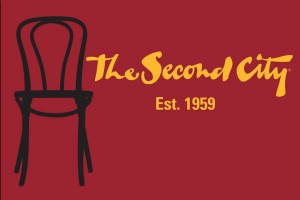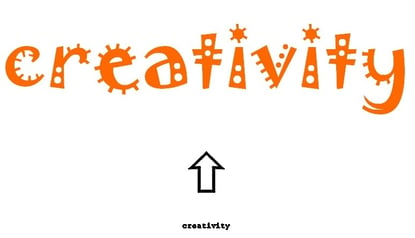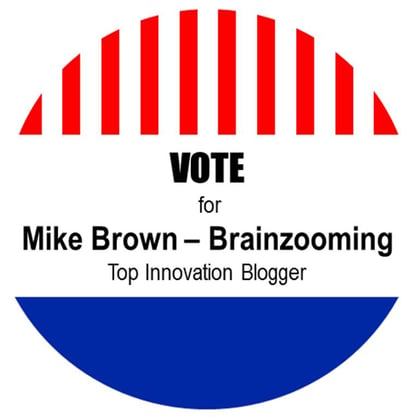I had the privilege of attending the Service Management Forum in Atlanta. Service Management Group, a Kansas City company specializing in helping businesses develop, measure, and monitor differentiated customer service experiences, has been organizing the Service Management Forum for 14 years. The Forum has a reputation for a terrific line up of thought-leading business executives, academics, and motivational speakers.
The Forum theme surrounded innovation, supported by the title, "Think Different. Be Different." With a title like that, who wouldn't want to be there!
Two of this year's speakers leveraged concepts from improv comedy for business and innovation lessons, with five important improv lessons for innovators shared during the Service Management Forum.
Lesson 1 - Make Little Bets
The first speaker offering innovation lessons from comedy was Little Bets author Peter Sims (Twitter @petersims). Peter started with a clip from the 2002 Jerry Seinfeld documentary, "Comedian" to demonstrate Little Bets since "most successful entrepreneurs don't begin with brilliant ideas - they discover them." During the clip, Seinfeld is on stage at a small comedy club, struggling to work out new concepts and ideas. It was almost painful watching Seinfeld try out ideas that weren't connecting with the audience. Not connecting is actually an understatement, he was flopping. Through this clip, Peter's point hit the mark.
We are all accustomed to the polished brilliance of Jerry Seinfeld. Contrary to popular belief, "brilliance" doesn't pop up out of thin air. Rather, comedic brilliance results from many hours of hard work, trial, error, and numerous iterations - "experimental innovation." Top comedians such as Jerry Seinfeld and Chris Rock become top comedians by experimenting through Little Bets to find big, successful ideas.
The next lessons were provided by The Second City's Communications group (Twitter: @SecondCityBiz) via a hilarious, gut-busting performance by an improv troop from The Second City. Besides laughing so hard my abs hurt, we saw principles of improv in action. However, I suspect that most of us in the audience were unaware of the improve lessons we were being exposed to since it was just great improv comedy!
Forum participants subsequently spent an hour learning a number of their key tricks-of-the-trade from two of The Second City Communication Group's experts as we participated in several improv drills driving home the principles they were teaching and had demonstrated on stage.
Lesson 2: Bring a Brick, Not a Cathedral
This lesson builds nicely on Sims' notion of Little Bets in that it doesn’t insist on starting with a singular brilliant idea, but discovering it over time. In improv, the key to success is taking one person's idea and building on it just a little bit more, then passing it along to be built on even more by someone else. In time and with skill, something brilliant has the opportunity to unfold - the cathedral.
Great improv teams work together deliberately and carefully to keep things moving by only adding a little - and not trying to do anything more. If a member of the troop is trying to uncork something amazing on their own, they can become preoccupied with their own thoughts and miss what is being said around them. As a consequence, when the improv skit makes its way back to them, they can be caught off guard, unable to contribute appropriately, and bringing the skit to grind to an uncomfortable halt.
A parallel for this in business and innovation is the assertion that "Action Creates Clarity" from Peter Sheahan's (Twitter @PeterGSheahan) 2008 book FL!P. Sheahan states businesses would be far better served through an action-oriented approach "built on the fundamentals of behavioral flexibility and rapid decision making . . . [It needs] to have a broad vision, or what I call a trajectory, that compels you toward a better future. It should be flexible enough to absorb changes in market conditions and completely new technologies and products." Sheahan’s point is essentially the same as point being made The Second City, move forward, one brick at a time - but do move forward. That’s where improv lesson 3 needs to be employed.
Lesson 3: Be grateful for all information
The folks from The Second City spoke about being grateful for, and "taking really good care of the information" one receives. I thoroughly love this improv lesson!
All information is an opportunity to learn something. You don't need to like or agree with the information for a learning opportunity. Orienting oneself towards having a receptive and learning mindset, can make the difference between success and failure. And, if you are wanting to keep the innovation process going, you absolutely need to take really good care of, not only the information, but also the person(s), sharing the information.
The first step in demonstrating gratefulness for information is acknowledging the person delivering the information and the information shared. To appropriately acknowledge information, one needs to be alert to the information being presented. Beyond just being "aware" of the information, one genuinely needs to pay attention to understand the context in which it is being provided. One also must receive and thoughtfully process the information in order to provide feedback to sustain the creative discourse, applying the “Yes, and…” lesson.
Lesson 4: Yes, And…
The Second City states “Yes, and…” is foundation for improv success, building on there being no wrong answers in improv (except for maybe…. "no"). Yes, and… is a powerful mindset and approach. Yes, and… places one in the active listening mode and oriented toward building on the idea or information being shared. As with "bring a brick," one key to both improv and innovation, is to keep things going. Yes, and… almost magically helps this happen.
Yes, and… is empowering. Yes, and… also speaks to and organization’s cultural philosophy. With Yes, and… as the guiding approach for creative conversations exploring new concepts, there’s a greater desire to provide and share new ideas. This is a signature of a culture of innovation and learning.
Can you imagine having regular conversations that met with responses like this?
Boss: Yes! You know what, that’s a really cool idea! Thank you so much for sharing it with me. And, you know what, let’s take your idea, build on it a little, and make it even better!
Employee: OK, that's awesome! And maybe after that, we could go get ice cream at Baskin Robbins in the Bat Mobile!
I digress…. but hopefully you get the point. Yes, and… is BRILLIANT! And really really POWERFUL!
Lesson 5: It takes a team
Perhaps one of the most significant learning from The Second City is improv (like innovation) is inherently a culture of "we." The Second City shared the mantra, "I've got your back." That's actually pretty cool!
Improv (and innovation) success both require a team that demonstrates a culture of mutual and reciprocal support and trust. One has to have the desire and commitment to make others look good. If everyone on the team is committed to making each other look good, remarkable things can happen spontaneously! If one if focused on making themselves look good, an improv skit's likelihood of success is dramatically lessened. It takes a team of players all moving toward the same goal.
In a recent Brainzooming article, I highlighted innovation as a team effort. "In order for an innovative new product to get to market and become successful, many different people need to contribute to that success. Just like a baseball team (or improv troop), these different players have unique and complementary innovation roles and skills. These roles have to work together and depend upon each other executing their role to their fullest in order to come out with a win." The bottom line; if you want to be successful at improv, or at innovation, you need a really good team.
I have to admit I really didn't know much about how improv worked prior to attending the SMG Forum. And even after attending The Second City Communication's workshop, I can only claim a little more knowledge than I could previously. I've always had great admiration for comedy and in particular, improv; and my admiration has grown exponentially as a result of what I learned from Peter Sims and the folks of The Second City:
Let me hear what you think! - Woody Bendle



